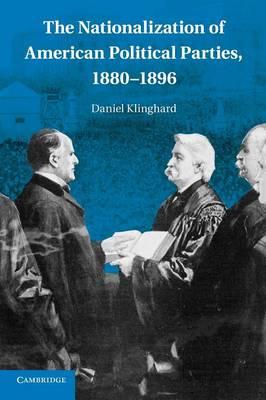Full Product Details
Author: Daniel Klinghard (College of the Holy Cross, Massachusetts)
Publisher: Cambridge University Press
Imprint: Cambridge University Press
Dimensions:
Width: 15.60cm
, Height: 1.60cm
, Length: 23.40cm
Weight: 0.440kg
ISBN: 9781107617926
ISBN 10: 1107617928
Pages: 282
Publication Date: 02 January 2014
Audience:
Professional and scholarly
,
College/higher education
,
Professional & Vocational
,
Tertiary & Higher Education
Format: Paperback
Publisher's Status: Active
Availability: Manufactured on demand

We will order this item for you from a manufactured on demand supplier.
Reviews
In recent years, our understanding of long-term change within America's political parties has been increasing greatly. Rather simplistic accounts of how the decentralized 19th-century parties had transformed themselves into the more centralized and candidate-dominated parties of the later 20th century have been superseded by more subtle explanations. Daniel Klinghard's excellent book represents an important contribution to the research in political science and political history that has illuminated the long gestation period of much of the party transformation. Klinghard shows how moves towards more nationalized party organizations started early in the 1880s, and also how late 19th-century developments were a springboard for change in the next century. It is a book that displays great insight into the complexities of party politics at the end of the so-called 'party period.' - Alan Ware, University of Oxford As they practice politics, politicians instrumentally experiment with novel organizational forms, and that experimentation gives rise to a pragmatically-disciplined imagination through which they come to understand what they do within a much broader theoretical perspective. In this creative re-examination of American political development in the late nineteenth century, Daniel Klinghard clearly demonstrates that it was the practice of politics by experienced, ambitious party leaders, not the dreams of idealistic reformers, that recast relations with the national electorate and thus gave us modern democratic parties. - Richard Bensel, Cornell University Daniel Klinghard's book is institutional history and political analysis at its finest. Without a constitutional foundation, political parties in America had to be created and maintained by the wit of some our most astute politicians. Klinghard explains how and why they did so, surveying the whole nineteenth century and concentrating on its last two decades, when a new strategy was required to renew the party organizations. All who are interested in party history and development will want to read this fascinating and important work. - James W. Ceaser, University of Virginia
Author Information
Daniel Klinghard is Assistant Professor of Political Science at the College of the Holy Cross in Worcester, Massachusetts.




